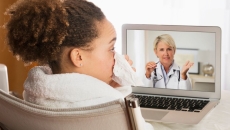Telehealth
Sean Mehra, a telehealth specialist, predicts the next 10 years of virtual care – and explains why the trend of virtual-first is the way to go, in the view of many.
MSIA warns of "serious unintended" consequences from the proposed changes.
Frank McGillin, CEO of The Clinic by Cleveland Clinic, discusses how connected health tools are enabling cost savings, convenience and other specialty care innovations.
Also: FDA approves TytoCare's wheeze detection device, Gates Foundation funds breathalyzer that can detect infectious disease, and Google announces radiotherapy AI plan with Mayo Clinic.
This comes following positive outcomes seen from the temporary conduct of telemedicine during the pandemic.
Cybersecurity and health equity are among the key features of the Biden-Harris Administration's budget proposal for next year, with considerable funding for CISA, HHS and VA data and technology improvements.
One of the nurse executives who helped create the world's first virtual hospital offers a deep dive into the benefits of a hybrid approach to nursing that employs telehealth.
The two-week program fuses technology and traditional therapy to treat PTSD and other conditions in post-9/11 vets. Barbara Rothbaum, executive director of the Emory Healthcare Veterans Program and Trauma and Anxiety Recovery Program, explains.
The future of remote patient monitoring will be defined by broader adoption, novel devices, application to more conditions and consolidation of vendors, one expert says.
The telehealth company said data was transmitted to third parties without patient consent through pixel trackers, including online self-assessment responses and some clinical information.









